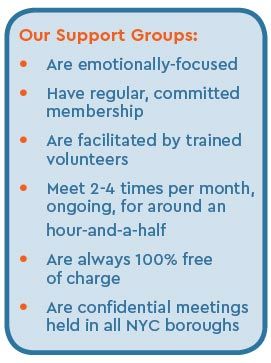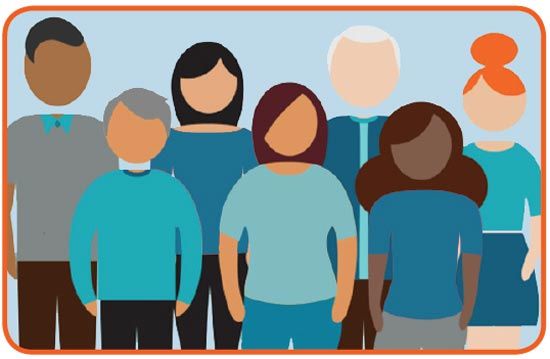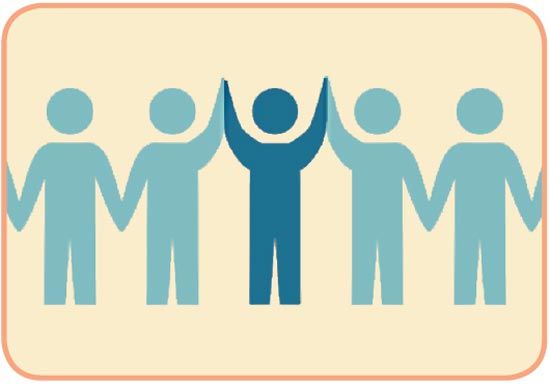Page Topics:
- Support Group Basics
- The Benefits of Sharing
- Bereavement
- What Support Groups Mean to Me by Elizabeth Mainiero
- FAQ
Support Group Basics
Being a caregiver for someone with dementia can be a daily challenge. The uncertainties of the disease, coupled with the emotional and logistical tasks of taking care of someone with dementia, can be exhausting.
The support group is a welcome refuge. It’s a safe place where I can share concerns, worries, anger, and anxieties with people who are experiencing the same feelings and issues. I am no longer facing my mother’s decline on my own but am now facing it with the support and understanding of others.
Maureen,
CaringKind support group member for over 6 years

It’s common to feel alone or overwhelmed when you’re a caregiver. Friends and family can be invaluable supports during the often difficult experience of caregiving. But, they may not always be available or understand what you’re going through. Sometimes it helps to talk to someone who gets it.
Support groups provide an opportunity to give and receive support from people who understand what it’s like to be a caregiver.
What is a Support Group?
You’ll find many different kinds of support groups out there, but here at CaringKind, it’s a group of dementia caregivers who commit to coming to the same group of people to share their own experiences and connect with others who get what they’re going through. They find relief in the relationships and connections that are built over time, and comfort in having people to turn to when things get rough.
Kinds of Groups
In every support group, you’ll probably find a range of ages, experiences and situations — people who are caring for someone in their home and who are caring for someone in a facility; people who are caring for someone nearby and people who are caring for someone far away; people at the beginning of caregiving and people towards the end.
Though some of our groups are for specific types of caregivers, you will find a variety of backgrounds and situations in every group. Available groups vary by the month, as membership fills, but generally we offer groups for:
- Adult children
- Spouses/partners
- LGBTQ community
- Daughters
- Siblings
- Frontotemporal dementia caregivers
- Lewy body dementia caregivers
- Creutzfeldt-Jakob dementia caregivers
- Veterans
- African-American community
- Long-distance caregivers
- Spanish, Russian, Mandarin, Cantonese, Korean-speaking caregivers
- General illness caregivers
(not all dementia-specific, though mostly) - Bereavement (these meetings are time-limited)

The Benefits of Sharing
What Happens When I Join a Group?
When you call, our Helpline Specialists and Social Workers will conduct a brief screening to see which of our services are most appropriate for your situation. Sometimes, support groups are most helpful and, sometimes, we find that individual support with our social workers is a better option.
If you are referred for a support group, you and the leader will connect, and make arrangements to meet in person to see if a group can meet your needs. If it can’t, we’ll work with you to find the right support for you.
If you join the group, the leader will review some important guidelines about how our groups run and what’s expected, including regular attendance and sharing your experience. Groups usually sit in a circle of chairs, and the leader will open the meeting by letting members know when someone is absent, and share any important news from CaringKind.
When you come to your first meeting, you’ll have an opportunity to introduce yourself to the group, share a little about your caregiving situation and get to know the other members.
People will share their present experiences with each other. Other group members will offer support and, if requested, advice or feedback.
The leader will make sure everyone has a chance to speak, although some people will talk more in some meetings than in others, depending on what they’re going through. People will be encouraged to explore the emotional experience of caregiving, and to connect with each other on this level.
The leader will close the meeting, and confirm the next group date.
Benefits of Sharing
We find that while caregivers can usually get the information and skills they need through our other programs and referrals, the support groups are often the best place to connect emotionally with other caregivers.
It’s not always a normal practice in every culture to openly share your feelings with others. Many people are taught that sharing negative feelings makes them worse, is a burden to others or will make them seem weak. Some people are so used to “thinking” about everything, they don’t always know how they feel - and that’s ok!
Learning to express your feelings to others can feel unnatural at first if you’re not used to it but, like any skill, it gets better with practice.
As humans, we have a deep-seated need for social support. The benefits of sharing your feelings in a safe environment are enormous:
- Learn healthier ways to manage difficult emotions.
- Sharing feelings can help you feel less isolated and alone.
- Actively holding back your feelings is hard work, and exhausts your body’s defenses.Gain insight into life experiences.

Bereavement
Our Support Group Leaders
Our Support Group Leaders are trained, screened and supervised volunteers and community partners all over the five boroughs. They run groups in six different languages and volunteer nearly 5,000 hours each year to this program. We would not have a program without their dedication and commitment.
Our Support Groups all follow the same model, whether the leaders are social workers, counselors psychologists, or former caregivers themselves. Leaders who are former caregivers may be drawn by their past experience to want to help others. However, in our model, they keep the focus of the group on the members and their experiences now.
Each leader has their own personality, experience and style, and while they all follow a similar model, each group has its own unique energy and culture.
After Caregiving: Bereavement at CaringKind
With all of the demands of caregiving and the ever increasing needs throughout the disease progression, there hasn’t always been time to cope with all of the losses that come with dementia.
Support groups provide relief during the journey of caregiving, and following the death of the person you’ve been caring for, our free After Caregiving Bereavement Groups can be a helpful next step. They run weekly for 10 weeks in a series, several times a year. There are groups for both adult children and partners/spouses, and they’re designed to help former caregivers understand more about the unique nature of grief following a death from dementia, and to make conscious choices about how to reconnect with others and with yourself, and to build your own future.
With our bereavement groups, you’ll have a chance to connect with other people who get what you’re going through and can help you process what you’ve been dealing with for the past several years. Whether it’s been a month or two, or a year or two since the death, our dementia caregiver bereavement groups may be helpful for you.
For more information, please call our 24-hour Helpline at 646-744-2900, and you can be added to the list for the next bereavement group. The leaders of the group will contact you before the next series starts.
What Supports Groups Mean to Me
by Elizabeth Mainiero
My dad was diagnosed with Early Onset Alzheimer’s one year ago. He had recently turned 62 and I had just celebrated my first month of marriage. It rocked our world.
I was left with an overwhelming range of emotions, questions, uncertainties and responsibilities. I felt sad, angry, lost, lonely, confused, uneducated, and powerless. A few months after the official diagnosis, a friend of mine mentioned CaringKind and that it was a resource based right here in NYC that focused on dementia and Alzheimer’s. I called the Helpline to ask for literature I could read, and information about seminars and support groups. The relief I felt when I was told there was a “Young Adult” support group that met once a month was palpable. I didn’t feel so alone.
Attending the first session proved to be easier than expected. CaringKind provided all the information I needed: time, date, location. The group leader called me a few weeks prior to ask me some questions, get a better understanding of my current situation and ask what I was looking for from the support group. She also told me a bit about the other attendees and what to expect. This included both the easy and the hard aspects and I really appreciated that. I was able to prepare myself a bit. Although I was very nervous attending my first session, once we began, I felt these nerves dissipate a bit and even more as I listened and found myself nodding.
This monthly support group has meant a great deal to me. In this first year of processing, living with and trying to understand this disease and diagnosis, the group has brought me comfort, advice, support and knowledge. There has been something very powerful about knowing there are other people out there, dealing with similar issues, who understand your emotions without you having to explain them and who can provide advice based on their own experiences. Attending a support group at CaringKind has allowed me to express my feelings, process them with different input, ask really hard questions and share experiences I didn’t know how to discuss with others. The group is judgment free, supportive, caring, honest and not afraid to acknowledge similar feelings, experiences or fears. I have come to look forward to our monthly meetings. The group has provided a safe outlet, a network of people to lean on and a place to feel a bit better about the most difficult thing in my life.
Joining the support group has also introduced additional CaringKind resources. I’ve heard about upcoming seminars, discussed recent articles, received references for therapists and used the Helpline to ask questions related to estate planning. All of it combined is invaluable.

Frequently Asked Questions
When I call about support groups, the Helpline Specialist asked me personal questions. Why can’t they just send me to a group?
Answer: Since our groups are ongoing and relationship-based, we invest a little more in making sure they’re going to be helpful for the people who attend. We want to make sure we get each client the services they need, and we ask about your situation and experience to make the best match possible. Also, the more we know about your situation, the better we can connect you with our other free services, too!
Can I just show up to meetings as needed?
Answer: Most of our groups are not “drop-in” groups — they have regular members who commit, meeting after meeting, to show up and support each other. This structure encourages relationships, connection and trust. When new members show up regularly, or regular people show up sporadically, a lot of group time is spent introducing yourselves, getting to know people or catching up. When you have the same group of people, you can really build on your relationships to support each other. A small number of our community partners do run successful drop-in groups, which accept anyone at any time. For more information, please call our 24-hour Helpline at 646-744-2900.
Who benefits from being in your groups?
Answer: Caregivers who want to connect emotionally with others who get what they’re going through, are able to share their feelings and experiences, and listen and support the experiences of others.
What if I want advice about how to manage challenging behaviors, or information about financial issues?
Answer: While this sometimes comes up in CaringKind support groups, we encourage you to attend our education and training programs. The Legal & Financial Seminar or the Family Caregiver Workshop are geared to answer these kinds of questions. All our services are free of charge. They are held on a regular basis in all boroughs to accommodate caregivers. Please call our Helpline to learn more and to register for our programs.
What does the support group leader do?
Answer: The leader facilitates the group process — that is, they help the members of the group connect with and talk to each other, share their experiences and maintain the group culture of trust, respect and connection. They don’t focus on providing factual information or setting agendas.
How is a support group different from therapy?
Answer: In both, there is a safe space provided to process feelings and experiences. In a support group, caregivers who are going through what you’re going through provide support and feedback to you, and the focus is on what’s happening right now with the person you’re caring for. It’s not about treating what’s “wrong” with you; it’s about building you up so you can cope better with the demands of caregiving. In therapy, modalities vary widely, but the therapist may share their expertise with you, go more deeply into your emotional/behavioral patterns, and the focus is on management and improvement of a disorder, situation or issue from your past or present. Many people, especially those with long-standing histories of emotional distress, may find being in both helpful.
